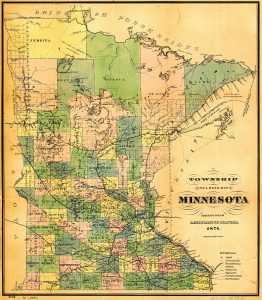 Before I began working at NEHGS in November 2015, I had a job where I interacted with between thirty and fifty different people every day. One of those people was a linguist, who, upon hearing me speak, said, “You aren’t from here.” She was right. As I’ve mentioned in previous posts, I grew up in northern New Hampshire and moved to Massachusetts in 2011.
Before I began working at NEHGS in November 2015, I had a job where I interacted with between thirty and fifty different people every day. One of those people was a linguist, who, upon hearing me speak, said, “You aren’t from here.” She was right. As I’ve mentioned in previous posts, I grew up in northern New Hampshire and moved to Massachusetts in 2011.
I said to her, “No, I’m not from Massachusetts. I’m a transplant.”
Her answer, oddly enough, was, “You must be from Minnesota.”
I remember being surprised by her determination, which led to a discussion about why she thought that I was from Minnesota. Her answer was that I had a distinct lilt in my voice that she had studied and found to be associated with those of Scandinavian origin. I’ve learned, after researching several cases involving Minnesota, that it does have a high number of residents who claim Scandinavian heritage. However, the ancestors I’ve identified to date arrived in the Northeast and stayed here. In fact, I’m one of a few black sheep who dared move more than fifty miles from my extended family.
[She] was adamant that one of my parents was Scandinavian...
After I explained to her that I was from northern New Hampshire, she was adamant that one of my parents was Scandinavian, or descended from someone who was. I’ve researched quite a bit of my own ancestry, and I have yet to uncover one ancestor of Scandinavian origin. I told her that as far as I knew, I was French, Italian, and English.
It’s been years since I had this discussion, but I remember it distinctly. It was the first thing I thought of when I received my DNA results from 23andMe in January. Most of the results were what I expected. I have French, Italian, and British ancestry. However, there were a couple of unexpected results as well. According to my DNA (about which, I admit, I am nowhere near as well-versed as others who work at NEHGS), I also have Iberian and Scandinavian ancestry.
I still have not managed to trace any ancestors who were Iberian or Scandinavian; however, it is possible that they are in generations further back than those I’ve managed to uncover to date.
I have not seen the woman who told me I must be Scandinavian in years, and part of me wishes I were still in contact with her, so that I could tell her she was right about my ancestry. The more I think about her determination, the more I wonder if linguistics are a part of genealogy that hasn’t been explored yet. I took a linguistics course in college, and there are certain vocal qualities and/or phrases that are associated with different regions and cultures. There’s also the argument that people who move to different areas try to assimilate by adopting the same accent and language used by the residents in that area. I will be curious to see if, somewhere down the road, linguistics becomes a larger part of historical and genealogical research.
Share this:

About Julie Wilmot
Julie, a native of Errol, New Hampshire, holds a Bachelor of Arts degree in Anthropology with a concentration in Native American Studies from the University of Maine, Orono, and a Master of Arts degree in History and Culture from Union Institute and University. She has worked at the Northeast Archives of Folklore and Oral History in Orono, Maine, and was a presenter at the New England Historical Association Spring 2014 Conference in Springfield, Massachusetts. Her research interests include French-Canadian migration to Northern New England, and international cases.View all posts by Julie Wilmot →